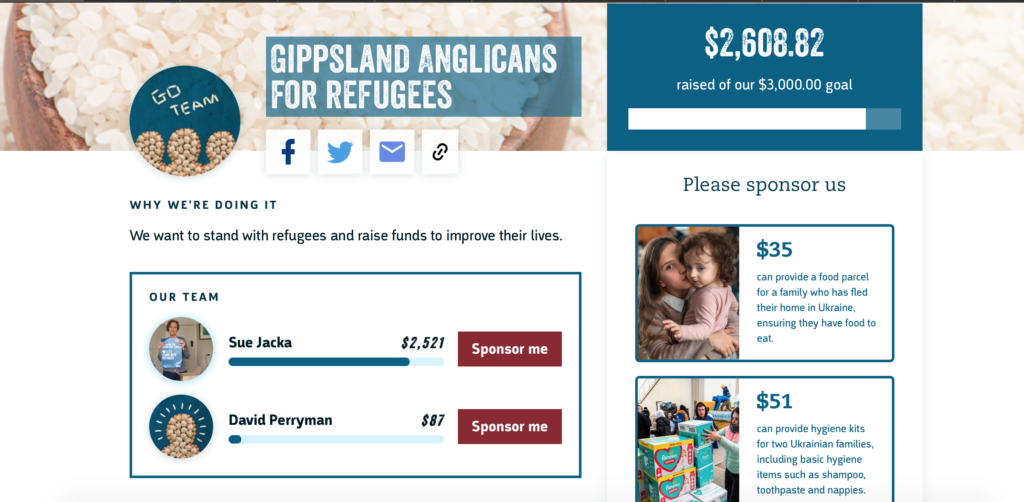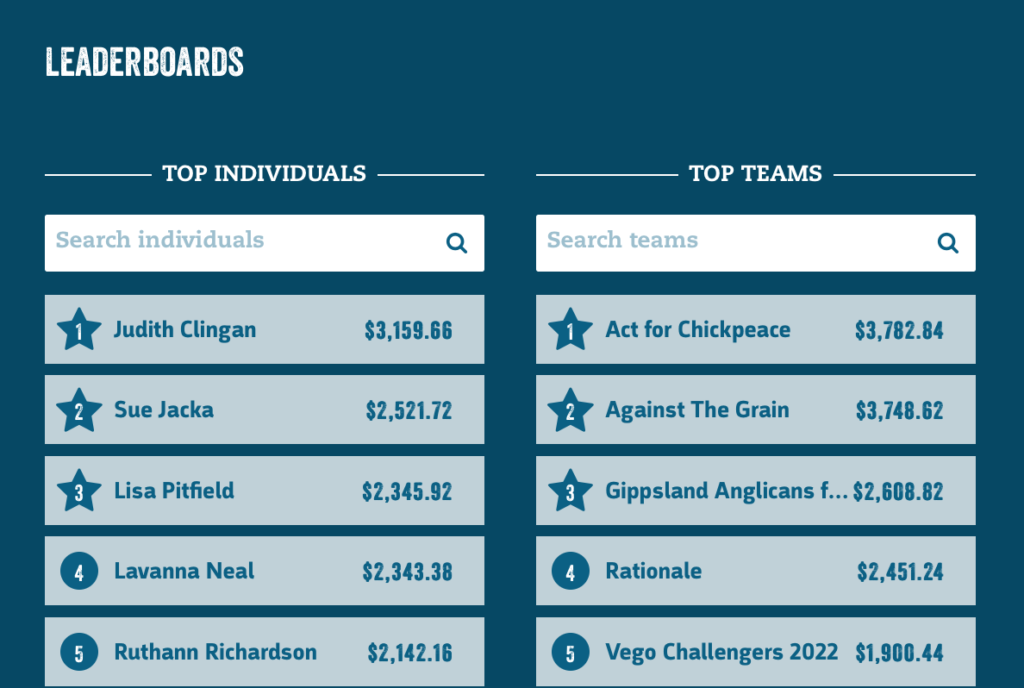Archdeacon Sue Jacka is the Rector of St Mary’s Anglican Church, Morwell, in Gippsland.

Sue is taking part in the Act for Peace Ration Challenge, 19th-25th June 2022. Act for Peace is the international humanitarian agency of the National Council of Churches in Australia.
Sue is part of Gippsland Anglicans for Refugees. She writes:
‘I’ve decided to do it again! With the Ukrainian refugee crisis there are even more refugees across the world. This challenge is very tough – for one complete week I will eat only what comes in the refugee rations just like those distributed to people who have fled their homes. It’s mainly rice and sooo boring! Will you please sponsor me and help refugees get some food, sanitary items and medical supplies?’
(The Ration Challenge website says that more than 84 million people have fled their homes worldwide because of conflict or disaster, and that number is rising. The United Nations refugee agency says conflict and disasters have now driven a record 100 million from their homes – the war in Ukraine has added significantly to the total with 8 million displaced within the country and 6 million forced to leave the nation).
Perhaps you might like to sponsor Sue, or someone else doing the Act for Peace Ration Challenge or consider doing this yourself (or join a team for solidarity!). The more sponsors, the more ‘rewards’ the person receives (eg spices, a little protein etc)



Many years ago, Geoff and I used to host a multi-faith group of young people (mainly international tertiary students) in our home for meals from time to time. On one occasion, the question was asked of a young Muslim woman: why do you fast in Ramadan? The response – in part – was: so that we know what it’s like to go without food, and will grow more compassion and empathy and care for others who live with deprivation all the time. And at the end of Ramadan, she said, they are encouraged to give money to a charity of their choice as an expression of that compassionate care.
‘The basic teaching of all religions is to develop a relationship with God and fasting is one way of achieving it because when we fast, we remember the blessing of life which we normally take for granted and sympathise with the sufferings of those who sleep on an empty stomach every day. This way we can become more compassionate towards our fellow human beings who might not enjoy the basic necessities of life’. (Prachi Wakpaijan)
‘During the Ramadan fast, we especially feel connected to the many in our neighbourhood who go without food because of poverty… When we break our fast in the evening, we make sure that we share our food with our neighbours. If one of our neighbours has nothing, we gladly share with them.” (Fatuma, a single mother of 9 children, Kenya – in online news snippet on Fasting for Solidarity)
Fasting is a spiritual endeavour in almost all religions all over the world. The idea of ’embodying’ deprivation for a time that would in turn grow compassion for, and solidarity with, those who is a really important concept. Indeed it has theological implications – taking on the experience of another’s lived reality. The Message Bible translates John 1.14 this way, “The Word became flesh and blood, and moved into the neighbourhood”. Jesus took on our flesh, lived in our reality, to show us the way to live – to love God, and love neighbour as ourselves.
‘Within the same family, can some members eat their fill while their brothers and sisters are excluded from the table? To think of those who suffer is not enough. A conversion of heart calls us to add fasting to our prayer, and to fill with God’s love the efforts that the demands of justice towards neighbour inspire us to make’.
(Pope John Paul 11)
Reflecting on Isaiah 58:1-9, Pope Francis reflects: “the Lord explains what true fasting is to these people who complained: ‘This, rather, is the fasting that I wish: releasing those bound unjustly, untying the thongs of the yoke; Setting free the oppressed, breaking every yoke; Sharing your bread with the hungry, sheltering the poor and the homeless; Clothing the naked when you see them, and not turning your back on your own. I want this, this is the fasting that I wish’”.